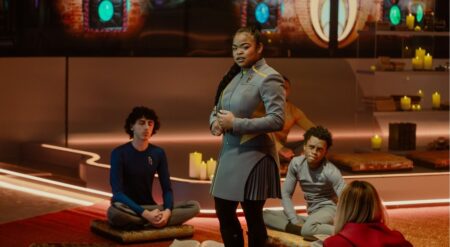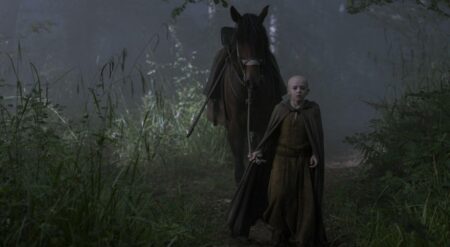
Jupiter’s Legacy Season 1 is a Netflix Original series based on the Image Comics series of the same name by Mark Millar and Frank Quietly. Sheldon Sampson (Josh Duhamel) protects the world as the Utopian. He leads the Union of Justice alongside his fellow heroes Lady Liberty, aka his wife Grace (Leslie Bibb), and his brother Walter (Ben Daniels), aka Brainwave. Yet while Sheldon excels as an actor, he fails to connect with his children Brandon (Andrew Horton) and Chloe (Elena Kampouris). Brandon chafes against Sheldon’s code of ethics, which he feels are “outdated,” and Chloe prefers to stay away from her family and engage in free-wheeling party life. Flashbacks reveal how Sheldon and his allies gained their powers after journeying to a mysterious island in the 1920s.
Jupiter’s Legacy is the first of multiple planned adaptations of Millar’s work, as Netflix purchased the rights to his Millarworld library of comics in 2017. I thoroughly enjoyed the comic book series when it was first released and was looking forward to this adaptation. However, watching all eight episodes reminded me of superhero media I’d already seen that explored the themes within Legacy, and they were done far better there. The superpowered son struggling to live up to his father’s ideals? Invincible covered that and did it far better. The weight of inheriting a legendary hero’s mantle? The Falcon and the Winter Soldier covered that in great detail. A dysfunctional superpowered family? The Incredibles, Superman & Lois…ironically, Netflix had already covered this path with The Umbrella Academy.
Not helping matters is the endless debate between Sheldon and the other heroes about whether or not his code has any merit in the present day. Not only has this debate been covered multiple times in superhero stories—namely Mark Waid and Alex Ross’s Kingdom Come, which remains the gold standard—it never goes anywhere. Over the course of eight episodes, Sheldon will argue that his code keeps the heroes from sliding out of line. Then, somebody—usually Brandon or another of the younger heroes in the Union—will argue that since the villains are fighting dirty, maybe the heroes should too. It goes on and on without any clear answer, and it’ll make audiences’ eyes roll into the back of their head.
The series also seems more interested in the flashback storyline than the main one, which is another point of frustration for me. The comic covered Sheldon and his friends’ journey to the island in a few pages; in the series, it’s dragged out over the course of eight episodes. While I understand that comic adaptations often expand or contract events in the source material, the journey to the island feels torturously long. Some of these flashbacks could have been dedicated to Sampson’s shaky bond with his children or the fallout with fellow hero Skyfox (Matt Lanter), as the latter plot point is brought up throughout the series. It feels as though the creators were holding off on certain events until a second season, which seems awfully cocky on their end as it remains to be seen if this series clicks with enough viewers.
Much of this dysfunction could be attributed to behind-the-scenes shakeups; showrunner Steven DeKnight departed the series in mid-production due to creative differences, with Sang Kyu Kim taking his place. I’m not sure what changed behind the scenes, but given DeKnight’s previous work on Smallville and Daredevil, it feels baffling that this series turned out as disjointed as it did. It’s also not surprising that the first and last episodes, which DeKnight penned, actually feel like the most coherent.
Despite frustrating story choices, the acting in Jupiter’s Legacy Season 1 is fairly solid, especially from Duhamel and Bibb. Duhamel moves as though the literal weight of the world is on his shoulders, with his voice taking on an appropriately gravelly tone (though his present-day wig leaves much to be desired). Bibb acts as the heart of reason; she’s the only person who is actually willing to take a nuanced approach to the multiple debates sparked throughout the series. Though Horton and Kampouris perfectly play “brooding young superhero” and “self-destructive socialite,” respectively as Brandon and Chloe, it’s Chloe who gets the lion’s share of screentime, especially as she starts a relationship with Skyfox’s son Hutch (Ian Quinlan). Given that a big deal is made out of Brandon inheriting Sheldon’s mantle, you’d think the series would focus more on that.
However, the standouts of the series are Lanter and Daniels. Lanter is a charisma magnet as Skyfox/George Hutchence, melding the wit of Tony Stark with the movie-star good looks of Aaron Eckhart in the past sequences. Daniels plays Walter with an avuncular approach that masks a lifetime of regret and anger; he resents his brother for seemingly getting ahead in life while he’s had to work hard for everything. This is especially clear in Walter’s interactions with Chloe and Brandon as he gives them the attention Sheldon never could and agrees with their life choices. I also have to give props to Tyler Mane and Anna Akana for playing nuclear villain Blackstar and psychic assassin Raikou, respectively; they make the most out of their supporting roles.
Though it has a solid cast, Jupiter’s Legacy suffers from glacial pacing, and hitting story beats previously explored in other forms of superhero media. If this series is renewed for season 2, I hope that the pacing and writing improve as this cast deserves better materials. I also hope that the next Millar series Super Crooks delivers on the promise of its source material, as it is tackling a new medium in the form of anime and has My Hero Academia‘s Bones involved in animation duties.
Season 1 of Jupiter’s Legacy is currently available to stream on Netflix.
Jupiter's Legacy Season 1
-
Rating - 6.5/106.5/10
TL;DR
Though it has a solid cast, Jupiter’s Legacy suffers from glacial pacing, and hitting story beats previously explored in other forms of superhero media. If this series is renewed for season 2, I hope that the pacing and writing improve as this cast deserves better materials.






